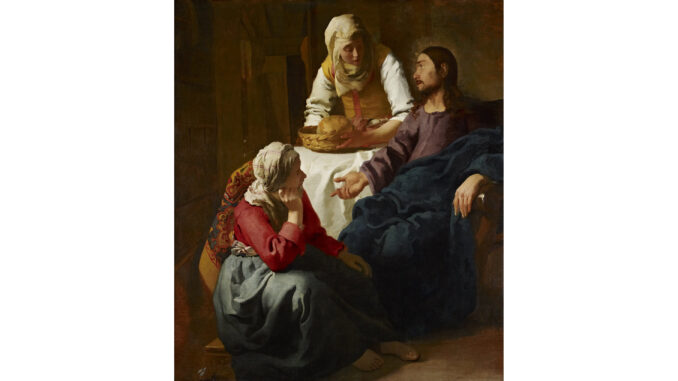
A mother sat quietly in her easy chair. Upon the floor near her was her little one playing — piling his blocks one upon another, then throwing them down and laughing in childish glee. He was all absorbed in his play. The mother gazed upon him with her eyes beaming. Presently she began to call him, “Baby, come to Mama! Baby, Baby, come to Mama!” but he played on unheeding. Again she called, but he paid no attention; his mind was occupied with his own affairs.
Presently the mother quietly slipped from her chair and went into an adjoining room, out of the baby’s sight. He did not notice her leave. He supposed that she was right there and that he could go to her at any time; but happening to glance up from his play, he saw that the chair was empty. The laughter ceased at once, and a cloud came over his features; he turned and looked all around the room, but his mama was not in sight. He saw only a stranger sitting in an easy chair. A pang of startled fear passed through him, and he began to cry and call very earnestly, in his baby way, for his mama.
It brought a quick response. The mother, leaving her concealment, rushed to him quickly, picked him up, and hugged him tightly to her bosom. His chubby baby arms were clasped about her neck as though he would never let her go. Soon the tears were gone and the baby’s face lay against that of the mother, while the joy of the mother-heart caused the eyes to shine like stars.
Now, the mother did not go away from the child because she did not love it, or because she thought that it did not love her; but she wanted to draw its attention away from its little concerns to herself. She wanted to show her affection for it and to receive its baby caresses in return.
Like that little one, we sometimes become so absorbed in our own pleasures, our work, or some little personal interest — that God does not attract our attention. His father-heart yearns for a season of communion with us. He wants to show his love to us and receive, in turn, our love and communion. But we do not heed him; we are too busy with other things; and so he quietly withdraws himself, and we become aware that we are alone. With that presence gone, how lonely we feel. How dark the world suddenly grows. How quickly we lose interest in the things that held our attention before. How we yearn for his presence again. How our hearts reach out for him. How our tears start. We think, “What have we done that caused him to leave us? Have we grieved away his Spirit? Have we sinned against him?” But he is not gone far — he is just beyond our vision. He is watching — he is waiting for our hearts to be drawn back to himself.
The mother would not have left her child, if by leaving she would have placed him in danger. She did not mean to stay away.
In the same way, God knows that to leave us thus is not to expose us to danger. He is watching, waiting anxiously the moment when he may return. And ah! when he does return and takes us in his bosom — then what words of comfort he speaks. What tender affection he shows. And how our hearts are melted and poured out in thanksgiving and adoration before him. If God apparently withdraws from us, it is only because he sees that we need to be left alone for a season. He sees that the heart must be drawn away from selfish interest; and when this is accomplished, he comes back and reveals to us anew the fullness and richness of his love.
Charles Wesley Naylor is considered one of the most prolific and inspiring songwriters of the Church of God. He was bedridden for much of his adult life but wrote eight books, a newspaper column and over 150 songs. Many of his writings are in the public domain.



